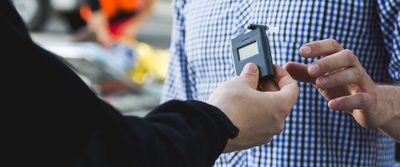If you or a loved one has been arrested for DUI/DWI, you are probably familiar with an ignition interlock device (IID) and the restricted driving program that goes along with it. If you’re not familiar with what an IID is, visit our FAQs page for answers to many of your questions. But in a nutshell, an IID is basically a car breathalyzer that is hooked into your car’s starter. If the device detects even the smallest amount of alcohol on your breath, it locks you out, and you can’t start your car. Pass the test, and you can start the car.
All 50 states and the District of Columbia have ignition interlock device laws. MADD is pushing for all states to require the devices for all DUI/DWI offenses, including all first offenses. As of 2019, 32 states and Washington DC have an all-offender requirement, so anyone arrested with .08 or higher blood alcohol content (BAC) must have an ignition interlock device installed in their vehicle in order to get their full driving privileges back.
Nationwide, the .08 BAC is the standard for a drunk driving charge, although the state of Utah recently enacted the nation’s strictest drunk driving law, by lowering the BAC limit to .05.
Studies Show Ignition Interlock Devices Stop Drunk Drivers
Ignition interlock devices have been in use in the United States since 1986 when the state of California started a pilot program. Due to the success of that program, just this year, California expanded the pilot program to the entire state. And according to a report from Mothers Against Drunk Driving, ignition interlock devices have stopped more than 2.3 million people from driving drunk since 2006. That figure is probably now much higher because the report measured IID data through 2017.
A study published in the American Journal of Preventive Medicine called “Ignition Interlock Laws: Effects on Fatal Motor Vehicle Crashes, 1982–2013” had some key points worth noting:
- Ignition interlock device laws reduce drunk driving accident fatalities
- IID laws mandating ignition interlock devices for ALL drunk driving offenders resulted in a 7% reduction in the number of drunk driving crashes involving a fatality
- Laws mandating interlock devices for first-time offenders with a high BAC of .15 or more were associated with an 8% decrease in the number of fatal drunk driving accidents
Ignition Interlock Devices Combined with Alcohol Abuse Treatment Reduce Recidivism
Multiple studies show that once an ignition interlock device is removed, the driver is likely to have another DUI. This is why many states are now requiring alcohol abuse treatment go hand in hand with the ignition interlock device restricted driving program. Florida mandated alcohol abuse treatment for drivers who violated their ignition interlock device program three or more times. A program violation was defined as attempting to start the vehicle with a BAC of .05 or above twice in the span of four hours.
The Centers for Disease Control (CDC) worked with the Florida Department of Highway Safety and Motor Vehicles (FLDHSMV) on a study that then compared the rate of recidivism (repeat offense) of the group who were mandated to participate in alcohol abuse treatment with a control group who were not required to get alcohol treatment. Both groups had ignition interlock devices installed in their vehicles during the study.
The study showed that during the two and a half years after the ignition interlock device was removed, the group that received alcohol abuse treatment had a 32% lower recidivism rate than the group that did not receive treatment.:
It’s estimated that the lower recidivism rate resulted in:
- 45 fewer DUI arrests
- 14 fewer vehicle crashes
- 10 fewer injuries
The study even had a positive economic impact on the state of Florida:
- The cost of treatment was $192,000
- The lower recidivism prevented $905,000 in costs related to DUI accidents
- The net benefit to the state was $713,000
The study concluded that including alcohol abuse treatment with ignition interlock device programs could reduce the recidivism rate once the IID is removed. To make the program work, drunk driving offenders would be required to complete alcohol abuse treatment before they could have their ignition interlock device removed.
State laws regarding drunk driving and ignition interlock devices are changing all the time. What is not changing is ALCOLOCK’s dedication to providing quality service to our customers. Our goal is to help you succeed in your restricted driving program.
Schedule Your Ignition Interlock Device Installation
At ALCOLOCK, we make scheduling your ignition interlock device installation easy. With hundreds of locations across the country, you can schedule installation at a location convenient to you. Use our contact form, call us at 866-700-9300, or call one of our certified installers directly. We can generally get you scheduled within 48 hours of your call.
